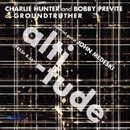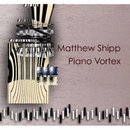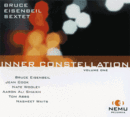 Charlie Hunter and Bobby Previte as Groundtruther with special guest John Medeski, “Altitude” (Thirsty Ear). No other new record in 2007 is gonna be this much pure fun. Seven-string guitarist Charlie Hunter and drummer Bobby Previte hit on the concept a few years ago: They’d make three albums together as Groundtruther, each one featuring a third wheel who’d bring out a different dimension. The first two releases, with Greg Osby and then DJ Logic, generated substantial fission, but with keyboardist John Medeski on the final installment they’ve melted down the whole plant. “Altitude,” fittingly, plays like a love letter to Iron Butterfly. In fact, the high-and-mighty year 1968 pops up again and again, with fuzz guitar á la Fever Tree and Canned Heat, Hammond organ straight outta The Nice, psychedelic soul groove courtesy of Vanilla Fudge and early War, fake sitar ripped from the Box Tops. God knows why these dudes (who’re about a decade too young to have been listening) fixated on the pre-Woodstock rock aesthetic, or where they scored the vintage effects boxes (or the vintage drugs), but it’s toy-store time, and they’re gonna PLAY. Fruggy rhythms bash, riffs stagger in dunderheaded circles, solos squeeze out rainbow cheez, structures dissolve into noise vomit, and the guy at the control panel spazzes out on the panning knob, strewing instruments and brains across the stereo field. A light show would be the right complement, but all you really gotta do is close your eyes. Talking about Disc 1 here; Disc 2, while adventurous in its own right, won’t spend as much time in your queue. Perfect for the front door at Halloween if you really want to scare some kids, it sounds as if the guys stripped down to acoustic instruments to make a fragmentary horror-movie soundtrack in an empty warehouse. Strange Satie-like piano astringencies, moanful Spanish guitar, chain-rattling percussion -- the second disc is the stuff of bad dreams. In a good way.
Charlie Hunter and Bobby Previte as Groundtruther with special guest John Medeski, “Altitude” (Thirsty Ear). No other new record in 2007 is gonna be this much pure fun. Seven-string guitarist Charlie Hunter and drummer Bobby Previte hit on the concept a few years ago: They’d make three albums together as Groundtruther, each one featuring a third wheel who’d bring out a different dimension. The first two releases, with Greg Osby and then DJ Logic, generated substantial fission, but with keyboardist John Medeski on the final installment they’ve melted down the whole plant. “Altitude,” fittingly, plays like a love letter to Iron Butterfly. In fact, the high-and-mighty year 1968 pops up again and again, with fuzz guitar á la Fever Tree and Canned Heat, Hammond organ straight outta The Nice, psychedelic soul groove courtesy of Vanilla Fudge and early War, fake sitar ripped from the Box Tops. God knows why these dudes (who’re about a decade too young to have been listening) fixated on the pre-Woodstock rock aesthetic, or where they scored the vintage effects boxes (or the vintage drugs), but it’s toy-store time, and they’re gonna PLAY. Fruggy rhythms bash, riffs stagger in dunderheaded circles, solos squeeze out rainbow cheez, structures dissolve into noise vomit, and the guy at the control panel spazzes out on the panning knob, strewing instruments and brains across the stereo field. A light show would be the right complement, but all you really gotta do is close your eyes. Talking about Disc 1 here; Disc 2, while adventurous in its own right, won’t spend as much time in your queue. Perfect for the front door at Halloween if you really want to scare some kids, it sounds as if the guys stripped down to acoustic instruments to make a fragmentary horror-movie soundtrack in an empty warehouse. Strange Satie-like piano astringencies, moanful Spanish guitar, chain-rattling percussion -- the second disc is the stuff of bad dreams. In a good way.
 Matthew Shipp, “Piano Vortex” (Thirsty Ear). Matthew Shipp is great when he’s just taking his piano for a spin around the galaxy, but he’s even better when he picks a planet and sticks to a close orbit, the way he often does here. Hanging with old pards Whit Dickey (drums) and Joe Morris (bass rather than guitar this time), Shipp slips into down-home storytelling mode, relaxed and free, sometimes intense. When Shipp feels a little bluesy, Morris breaks into a walk and the gang stops by Ray Charles’ pad with “Key Swing,” a composition bent only slightly with casual clusters of adjacent notes. On “Nooks and Corners,” Shipp stiffens his back and clues us how to update Mussorgsky with modern machinery -- wound up, cycling, playful. “Quivering With Speed” sounds like a prodding tribute to the late Andrew Hill. On “To Vitalize,” Morris makes us forget he ever played angular guitar as he strolls through Monkish scenery and draws the ensemble together with a centered bass solo. Dickey has grown even quieter and more subtle, his kit sounding almost like atmospheric/rhythmic fuzz around the other instruments rather than a separate entity. Believe it or not, this is good music for driving. Though you might end up at an unexpected destination.
Matthew Shipp, “Piano Vortex” (Thirsty Ear). Matthew Shipp is great when he’s just taking his piano for a spin around the galaxy, but he’s even better when he picks a planet and sticks to a close orbit, the way he often does here. Hanging with old pards Whit Dickey (drums) and Joe Morris (bass rather than guitar this time), Shipp slips into down-home storytelling mode, relaxed and free, sometimes intense. When Shipp feels a little bluesy, Morris breaks into a walk and the gang stops by Ray Charles’ pad with “Key Swing,” a composition bent only slightly with casual clusters of adjacent notes. On “Nooks and Corners,” Shipp stiffens his back and clues us how to update Mussorgsky with modern machinery -- wound up, cycling, playful. “Quivering With Speed” sounds like a prodding tribute to the late Andrew Hill. On “To Vitalize,” Morris makes us forget he ever played angular guitar as he strolls through Monkish scenery and draws the ensemble together with a centered bass solo. Dickey has grown even quieter and more subtle, his kit sounding almost like atmospheric/rhythmic fuzz around the other instruments rather than a separate entity. Believe it or not, this is good music for driving. Though you might end up at an unexpected destination.
 Bruce Eisenbeil Sextet, “Inner Constellation” (Nemu). Points for balls -- there ain’t many musicians who’ll anchor an album with a 47-minute comprovisation. Points for originality -- the morphing structures and specialized instrumental alignments won’t remind you of anybody else. The rest of the points depend on how easily you ears adapt to alien resonances. Composer Eisenbeil prefers a clean tone on his guitar, but he messes up preconceptions of the instrument by scraping the strings, plucking unusual chords, strumming nervously against what might pass for a beat. The other highly proficient melody players -- violinist Jean Cook, trumpeter Nate Wooley, altoist Aaron Ali Shaikh -- emphasize more naturalistic colors as they sing romantic solos, pair off in harmonies, execute quick unisons, or fall together into a Russian folk tune or an Ornettish group tangle. And the toughest task falls to the rhythm section of bassist Tom Abbs and drummer Nasheet Waits, who have to make it all hang together, and do. “Inner Constellation” is a suite whose bigger sections are marked off by swooning slides that let you easily slip into another world, to quote Henry Threadgill; you won’t know exactly how you got to each cosmos, and the swirling, dancing environments are attractive enough that you won’t care. If the music seems dispassionate, maybe new sounds require new emotions.
Bruce Eisenbeil Sextet, “Inner Constellation” (Nemu). Points for balls -- there ain’t many musicians who’ll anchor an album with a 47-minute comprovisation. Points for originality -- the morphing structures and specialized instrumental alignments won’t remind you of anybody else. The rest of the points depend on how easily you ears adapt to alien resonances. Composer Eisenbeil prefers a clean tone on his guitar, but he messes up preconceptions of the instrument by scraping the strings, plucking unusual chords, strumming nervously against what might pass for a beat. The other highly proficient melody players -- violinist Jean Cook, trumpeter Nate Wooley, altoist Aaron Ali Shaikh -- emphasize more naturalistic colors as they sing romantic solos, pair off in harmonies, execute quick unisons, or fall together into a Russian folk tune or an Ornettish group tangle. And the toughest task falls to the rhythm section of bassist Tom Abbs and drummer Nasheet Waits, who have to make it all hang together, and do. “Inner Constellation” is a suite whose bigger sections are marked off by swooning slides that let you easily slip into another world, to quote Henry Threadgill; you won’t know exactly how you got to each cosmos, and the swirling, dancing environments are attractive enough that you won’t care. If the music seems dispassionate, maybe new sounds require new emotions.
